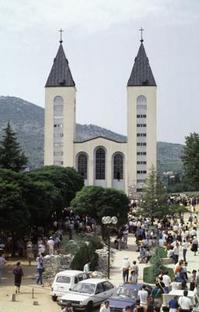(UPDATE 2/25: See the end of this article for an update on Thomas Müller's remarks.)<
Theologian Fr. Manfred Hauke's recent interview with the Tagespost Catholic newspaper has drawn a lot of attention since it was published on January 15.
The interview on the subject of Marian apparitions and the Medjugorje affair was picked up by news sites in Germany, Austria, the U.S., and Argentina. Recognizing the value of Fr. Hauke's contribution in moving the debate forward, Dutch- and Spanish-speaking sites translated all or part of the interview.
Outrage from offended followers of the Medjugorje visions was swift too: here in America, a Yale graduate student titled his rant "Theologian Manfred Hauke flunks Medjugorje 101". That text was copied to other websites and offered through the Google news service. Since then, the author seems to have felt some shame at his insult and changed the title of the commentary.
Christian Stelzer, a member of the "Oasis of Peace" community which illicitly operates in Medjugorje, countered the interview with a set of rather pat denials [in German] about some of Fr. Hauke's points. He pointed vigorously at the medical studies of the seers, as if they could produce a theological proof, but he did not even address the most critical argument against the messages: that some contain false doctrine.
From Germany, where the interview first appeared, a transitional deacon by the name of Thomas Müller attacked the professor on the news site kath.net, which promotes the alleged apparitions, accusing him of "spreading lies and half-truths" and of unscrupulously considering "any means correct". Müller writes:
It is frightening how lightly Prof. Hauke calls for the "love of truth", but spreads complete lies and half-truths himself in this interview, and silences known facts. Through it all, he sets about to mix with Medjugorje negative incidents which have nothing to do with it.
The high point, then, is the indirect conclusion that the fruitfulness of Medjugorje, which has been unique in the world in relation to conversions, vocations, the revival of the sacrament of penance, the rosary, and love for the Eucharist, comes from the work of the Devil and that the messages represent a spiritualistic phenomenon. This is an insult to God, since Hauke is thereby saying that the Devil, in order to deceive the Church, is more fruitful than the Holy Spirit.
[my translation --RC]
Clearly this is a man in high dudgeon, and not above putting words in other people's mouths.
(Here is a machine-generated translation of Müller's denunciation, for those who cannot read the original.)
But, as St. Paul teaches, all things work together for good, for those who love God. These overwrought and reckless offerings have done a service for the Church, by revealing the depth of illusion, of denial, even sometimes prelest, if I may say so, generated by the false mysticism of Medjugorje.
Professor Hauke, in turn, has replied to this criticism with a statement that backs up his assertions. In the face of outrage, he is calling for more objectivity and scholarly prudence. The German original of his response is on kath.net, and an English translation follows here:
An Appeal for Objectivity
A response by Prof. Manfred Hauke to Thomas Müller's critique of his interview on Medjugorje
For years there has been a contentious debate about the so-called "Marian apparitions" of the seers who originated from Medjugorje. The current official position of the Church is still the 1991 declaration of the Yugoslav Bishops Conference, which emphasizes: "non constat de supernaturalitate", i.e. it cannot be affirmed that these matters concern supernatural apparitions or revelation. The local Bishop Ratko Perić goes beyond this affirmation and has emphasized his conviction, according to which it has been established that the pertinent phenomena are not of supernatural origin. Among Catholic Christians, it should be possible to discuss the questions connected with this matter objectively. My interview in the Tagespost, which has been propagated in various languages since then, was a contribution to this very necessary discussion. If it should happen that I have, in the process, repeated any false information, I am ready and willing to correct these errors. Thus far I do not see any reason for corrections.
In any case, I am shocked over the unobjective reactions of certain followers of the Medjugorje movement, who ascribe bad intentions and "lies" to me. To "lie" means to consciously state a falsehood. In my scholarly career of nearly thirty years now I have fought out many battles and have had to bear many criticisms, for example the polemics of a "woman priest" ordained somewhere on the Danube between Linz and Passau, in the magazine Publik-Forum. But even in these circles no one has ascribed a "lie" to me so far, or a presumption "that the end justifies the means". Such reactions are character assassination. Among these, sadly, is the contribution of Deacon Thomas Müller, which appeared in kath.net (18 Feb.). Deacon Müller, who has published a master's thesis ("Diplom" in German) on Medjugorje, asserts that I have spread "complete lies and half-truths" in my interview and that I "set about" "to mix with Medjugorje negative incidents that have nothing to do with it." He speaks of "untruths and distortions". Because I, on the basis of the facts presented to me, consider the possibility that the visions come from the workings of the evil one, I am even accused of an "insult to God". These accusations are very grave.

 (Translated from the German-language Catholic newspaper
(Translated from the German-language Catholic newspaper